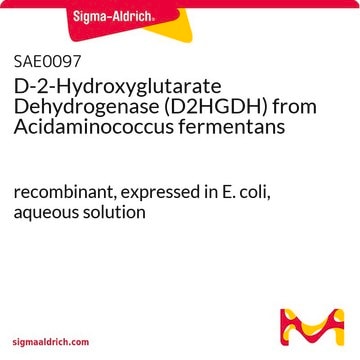90790
L-α-Hydroxyglutaric acid disodium salt
≥98.0% (GC)
Synonym(s):
(S)-2-Hydroxypentanedioic acid disodium salt, Disodium (S)-2-hydroxyglutarate
About This Item
Recommended Products
Assay
≥98.0% (GC)
form
powder or crystals
optical activity
[α]/D -8.5±1.5°, c = 1 in 0.1 M NaOH
impurities
≤6.0% water
relevant disease(s)
cancer
storage temp.
2-8°C
SMILES string
[O-]C(CC[C@@H](C([O-])=O)O)=O.[Na+].[Na+]
InChI
1S/C5H8O5.2Na/c6-3(5(9)10)1-2-4(7)8;;/h3,6H,1-2H2,(H,7,8)(H,9,10);;/q;2*+1/p-2/t3-;;/m0../s1
InChI key
DZHFTEDSQFPDPP-QTNFYWBSSA-L
Looking for similar products? Visit Product Comparison Guide
General description
Application
Biochem/physiol Actions
Packaging
Storage Class Code
11 - Combustible Solids
WGK
WGK 3
Flash Point(F)
Not applicable
Flash Point(C)
Not applicable
Certificates of Analysis (COA)
Search for Certificates of Analysis (COA) by entering the products Lot/Batch Number. Lot and Batch Numbers can be found on a product’s label following the words ‘Lot’ or ‘Batch’.
Already Own This Product?
Find documentation for the products that you have recently purchased in the Document Library.
Customers Also Viewed
Protocols
We describe here a rapid and sensitive method to separate and measure D-2-OHG and L-2-OHG enantiomers using high-resolution mass spectrometry (HRMS) detection.
Chromatograms
application for HPLCapplication for HPLCOur team of scientists has experience in all areas of research including Life Science, Material Science, Chemical Synthesis, Chromatography, Analytical and many others.
Contact Technical Service













